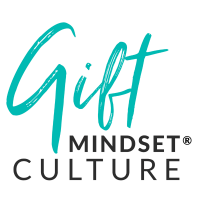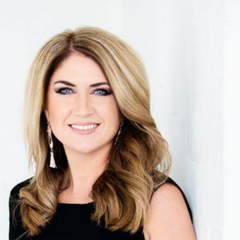Right now, many organisations are facing these challenges:
Workplace culture is made up of shared values, beliefs and social behaviours and so often these can be hidden, stifled or not lived within the organisation. The lessons we learn need to be shared to empower others, create openness and trust and in the process, become a survival guide for others, including that for future leaders.
Gifts can come in many ways; we just have to be open to seeing them. These lessons can come from people and situations and can be from the past, the present or the future. By adopting a Gift Mindset®, we get to live our legacy now by leading a culture of purpose, connection and contribution.
Challenging situations and people can be seen as ‘gifts’ that are just as valuable as the amazing positive situations and people we encounter in life. To embrace them, we need to raise our awareness, accept them as gifts and apply the lessons they present both as a limitless leader and in our own life.
We need, in other words, to adopt and foster what I call a Gift Mindset. This mindset is a key trait of a Limitless leader.
Why we need to create a gift mindset culture?
If we choose not to learn from and share our lessons or close ourselves off from receiving lessons from others, we risk robbing the world of our insights or, worse, contributing mindlessly to a world already heavy with distraction and clutter.
Never before have we lived in such a connected world, but at the same time being so disconnected.
It is important to remember that no-one is you, and that is why sharing your gifts is vital. The sharing process can get you out of your own head and reinforces your uniqueness. It gives you the ability to help others grow through your lessons, both positive and negative. Contribution is a core human need, as is connection: we are all wired to connect. By adopting a Gift Mindset, you satisfy these needs, not only for you but for those around you.
To address organisational challenges and survive and thrive in a fast-paced and challenging environment, we need to tap into the four areas of VUCA. This is a philosophy coined by the US Military to present the context in which organisations view their current and future states. This includes Volatility, Uncertainty, Complexity and Ambiguity. Adopting the Gift Mindset can assist with this.
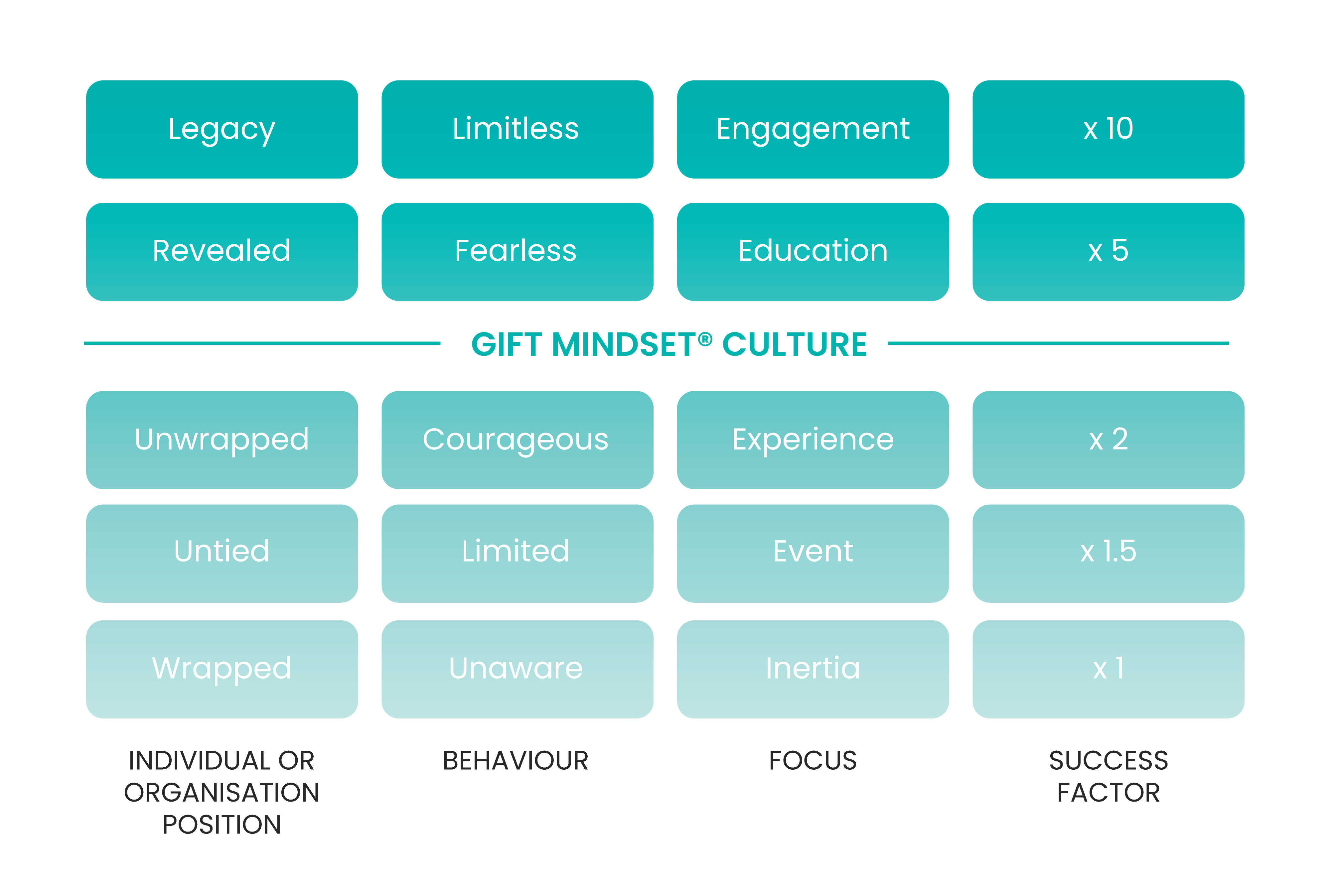
This pathway demonstrates how an individual and organisation can transform:
Adopting the Gift Mindset is a key trait of Limitless Leaders and Organisations
A Gift Mindset® culture can:
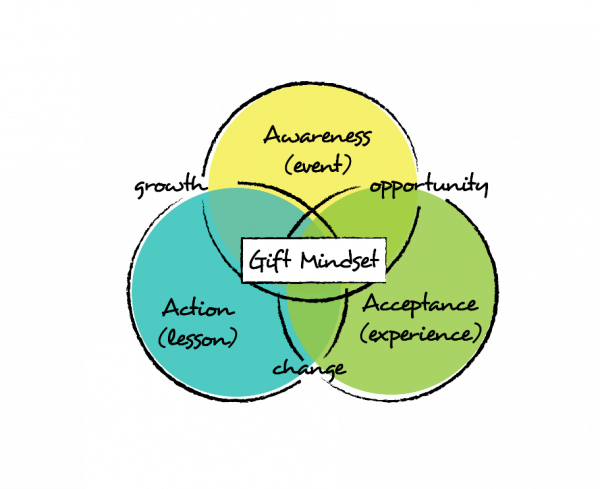
Creating a culture where we adopt the Gift Mindset within the workplace can take leadership, connection, collaboration to the next level. By sharing the experiences and lessons we encounter, both challenging and positive, we can empower others and create a culture of honesty and openness and live our legacy.
The good news is we have created a transformational pathway to do just that!
The Gift Mindset® Culture Program!
Throughout this highly interactive immersive program, participants will understand the benefits and application of the gift mindset and the importance of sharing their learnings at work.
Program Overview
The program will run as a series of interactive sessions to explore and expand on the Gift Mindset concept and will then deep dive into each of the 12 gifts. These gifts can be run in any order based on your priority needs. All sessions will take place in a learn and do environment with a plan of application back into the organisation.
The program consists of 13 immersions.
These can be run face to face or virtually.
Immersion 1
Unwrapping the Gift Mindset
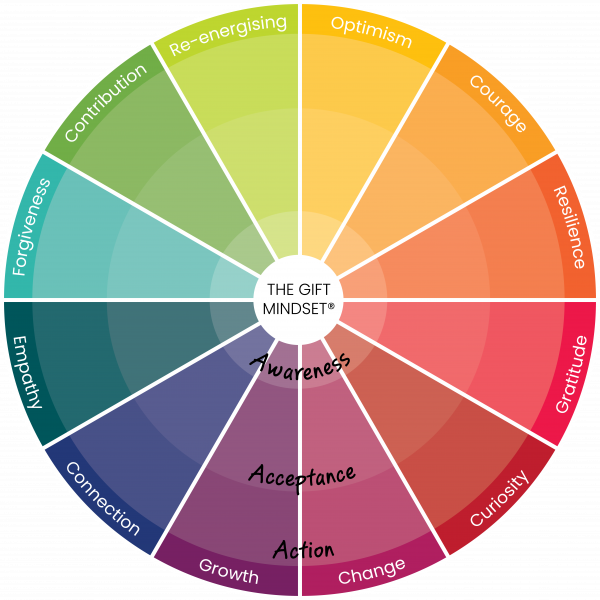
Immersions 2-12
The 12 Gifts
In each of the 12 Gift sessions we:
The G. I. F. T. Mindset Process

The 12 gifts can be run in any order – here is an overview:
![]()
What makes you optimistic now, in the past, for the future?
Optimism is a key trait of success, happiness and effective leadership of self and others.
In this session, we explore and expand on the challenges with optimism and the benefits of it in our professional and personal life. We then unwrap the 4 stages of optimism and how we can move from pessimism to optimism. The “6 Keys” to bring optimism into the workplace are workshopped, and individually, then as a group, we work through the G.I.F.T process to unwrap and share each individual’s story and experience of optimism and what has been learnt.
Courage transforms fear, and sometimes even shame, into determination. At times when we want to give in, courage helps us continue; it’s the fuel to propel us forward. It helps us reach beyond our comfort zone and welcome new challenges. Above all, it helps us to accept the challenges life throws at us. In any role, we need to build our courage muscle and access the gift of courage in our lives.
In this session, we explore the three operating zones of courage to go from our safe zone to our stretch zone. We workshop the 6 keys to building this gift. Individually and as a group, we unpack the process to share our gift of courage with the wider group and how to apply the lessons learnt.
Resilience is the strength of spirit to recover from adversity. It enables us to find hope and the courage to continue, even when faced with tragedy or negative circumstances. Resilience isn’t a trait but, instead, a result of tapping into internal and external skills and resources.
In this session, we explore the 3 key elements of resilience and the 6 keys to building resilience in the workplace, including; developing supportive relationships and empathy, fostering gratitude and reframing the script. We also delve deep into ways to spark your motivation and confront the things you fear. Each person then shares their gift of resilience and a plan of action to build this gift.
Gratitude is the glue that can fortify relationships and serve as the backbone of human society. Organisations that practise gratitude regularly by creating activities and forums to share see people who are more generous, kind and wanting to build strong relationships. We need to ‘feel into’ gratitude – something often missed in today’s busy world. The pace at which we live and workplaces fostering a ‘performance culture’ can stifle the Gift of Gratitude.
In this session, we explore the key obstacles to gratitude and the benefits of it within the workplace. We then apply the H.E.A.R.T model to create a gratitude practice and uncover tips and tools to fast track this. The group then shares their plan and gift of gratitude.
Curiosity is a skill and also a characteristic – a motivating desire for more information. It’s the engine that drives learning and achievement, and it’s almost like a state of arousal that needs to be provoked. Being curious requires us to ask questions of ourselves, situations and others. This helps us grow and be what I call ‘in flow’ in and out of the workplace.
In this session, we explore state and trait curiosity and the importance of it in the workplace to spark creativity, innovation and future thinking. We break down the 3 steps to curiosity to shift from observation to provocation and then to exploration. We look at the key tools and insights to embed curiosity into your everyday approach and then share our individual gift of curiosity through storytelling.
Change is the only constant in life. It can be chosen or forced upon us. Change can be the portal to growth, possibility and new directions. Our ‘why’ to change must exceed our ‘why’ to stay the same. To embrace known and unknown change, we need a compelling reason and the motivation to do so.
To unwrap the Gift of Change, we will explore how to embrace change and the reasons why, as humans, we usually resist it. We will then expand on the 8 key strategies to deal with any change, in both your professional and personal life. Many people resist change, while others embrace it. Certainty is a core human need, therefore it is natural to resist what is unknown to us. Individually and then shared with the wider group we will unwarp our gifts of change, what we have learnt and how it can be applied in the workplace.
Pushing ourselves outside our safe zone triggers learning by expanding our thinking. Growth is anything outside what we think we know – being stretched outside what you know helps you discover new ways to do (and not do) things. Taking risks and challenging the status quo can set the scene for others to follow and adopt a ‘comfortable being uncomfortable’ mindset. With change as the only constant, stretching ourselves and others is key to staying relevant, challenged and innovative in today’s business landscape.
In this session, we look at the key obstacles that stunt our growth and ways to get comfortable being uncomfortable. We explore the 6 key strategies to ensure growth becomes part of who we are and what we do. We unwrap our lessons of growth through the G.I.F.T questioning process and formulate a plan of action to implement back in the workplace and ensure ownership of this.
Connection is an innate human need; we are all wired to connect. We need to make the time to connect with ourselves and others, both in and out of the workplace. This builds and strengthens relationships and interactions, much needed in the busyness of the world today. In this session, we explore the 5 ways to connect as a leader, the 4 drivers of whole connection and eleven hacks to build connection. We workshop through these processes and then use the G.I.F.T model to reflect and then share our stories and lessons of connection.
Expressing and receiving empathy is vital in any role, interaction and relationship. Living the Gift of Empathy throughout our lives helps us to live from a place of understanding, care and empathetic connection. Empathy is a key trait for effective self-leadership and leadership of others and is often neglected when time poor or disconnected from ourselves and those around us.
In this session, we explore the Gift of Empathy and unwrap the 3 layers, including; cognitive, emotional and compassionate empathy. We look at the difference between pity, sympathy and empathy and the role each plays. We workshop the 6 keys to building empathy and then share our stories and lesson around this gift and how to play it in the workplace.
Psychologists define forgiveness as a deliberate and conscious decision to let go of, or release, feelings of resentment towards a person, a group or a situation. It is a process of letting go of hurt and anger, whether or not forgiveness is deserved. When we come to forgive, it doesn’t mean we forget or condone what has happened. Instead, we forgive to create peace and a space to move forward. Holding onto resentment is like poison, and every human deserves peace within.
Forgiveness is rarely discussed in the workplace. Imagine, though, if you could share your Gift of Forgiveness and the lessons you gleaned. Relationships would be truer and stronger, and this could lead to a more collaborative culture.
In this session, we workshop the benefits of forgiveness and the key strategies to practice this gift in the workplace.
Contribution is a core human need. Contributing to both ourselves and others can assist us in leading a more satisfying and purposeful life. Contribution is the gift that keeps on giving and can create a legacy that touches others and enables them to contribute themselves. We need to contribute to ourselves, our work team, home team and community.
In this session, we unwrap the four keys of Contribution and the areas and ways you can contribute to achieve purpose, balance and fulfilment in and out of the workplace. We workshop tools and ideas to contribute in each of the four areas and create a practical action plan to embed these in the areas of contribution that may be lacking. This could be to your work team and includes; supporting others, sharing skills, giving your time, setting goals around ways to contribute and share ideas and providing feedback. We then use the GIFT process to unwrap the Gift of Contribution for each individual and share it.
Re-energising is vital to being our best selves. Having a deep awareness of when and how to re-energise is key. It’s important to reflect, refocus and recharge to restore our energy. Know what ‘good’ energy looks like for you and your team in the workplace. If you notice a gap in energy in your team or peers, you need to open the door to explore this and see what is going on. When we re-energise, we need to tap into the four pillars of our wellbeing – physical, emotional, social and spiritual – to ensure balance. Too often, our energy is depleted, and this may be caused by; unclear role expectations, communication breakdowns, dysfunctional team dynamics or a lack of work life balance.
During this session, we identify what depletes our energy and how this can affect us in and out of the workplace. We unpack the seven strategies to live the gift of re-energising, including living with purpose, understanding what lights you up, adopting a positive mindset, exercise and sleep and practising mindfulness, amongst a few. We share our lessons relative to this gift and create an action plan to re-energise.
Create Psychological Safety and Connection through a Gift Mindset
CEOWORLD Magazine
Most of us experience challenges, crises, triumphs, and success in our professional and personal life. Life throws us curveballs. Some are made of glass and hard to catch, some bounce off us and others seem to fall straight into our hands. These experiences are ‘gifts. How we catch (or drop) these gifts depends on our mindset, perspective, beliefs, experiences, values and many other things.
Are you ready to create a gift mindset culture?
Connect with Renée and team for more information.


